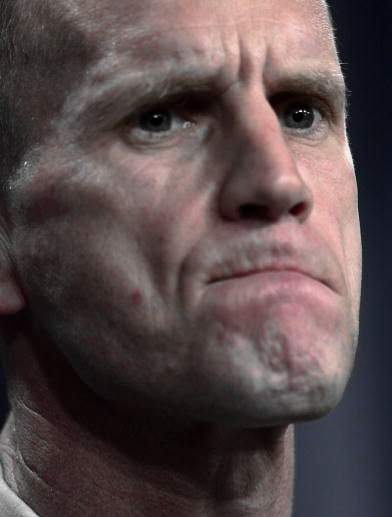
While Erick Erickson pretty much defeats himself in citing Jonah Goldberg right off the bat, his October 5th column does illustrate perhaps the beginnings of an interesting fold to the hoopla that McChrystal has been a part of lately.
There has been much to do about how General McChrystal has been frozen out by the President over Afghanistan policy. Much of it is a sort of generated controversy by folks who have been wildly and willfully ignorant of the chain of command, and how it is used.
While Erickson made a tortuous path to connect dots in his October 5th entry, it does begin to connect other dots. Less about how McChrystal is being frozen out, or how Afghanistan is being sacrificed, but rather beginning to show the purpose to the amazing amount of cognitive dissonance about the chain of command, and why McChrystal may be bucking and talking out of school.
Mind you, McChrystal is hardly new to controversy. His handling of the Pat Tillman friendly fire incident makes him an interesting choice to serve up as a potential martyr. And oddly vulnerable–which in some ways makes him more attractive to some to be the lead dog to turn Afghanistan policy, and paint the President as a vindictive and vengeful on subordinates who buck the system. Especially when folks are willfully ignorant on how the chain of command works, or why his statements have been shocking as of late.
But it represents perhaps a longer game being put into play. By serving up McChrystal as Judas Goat, it distances many from the Bush Administration policy of ignoring Afghanistan and putting the conflict that we should have focused on–and its bungled time table and under resourcing–into a hazier focus. It swings attention away from the Bush Administration and puts the war in context with the Obama Administration. And while McChrystal is critical of how the previous Administration handled things, it makes him more attractive as a martyr to a cause. And it has the fingerprints of AEI confidants who have Ivory Towered their way into foreign policy and wartime efforts with brazen indifference to the human cost, and their own often conflicting interests.
Erickson’s blog entry is less interesting in and of itself–and by citing Goldberg, it pretty much turns itself into a parody–but as a part of an over reaching narrative that is shaping itself with McChrystal at the center, less as a motivating factor, but as a framework to address a larger message. It is going to be of interest to see how the message is filled out over the next few weeks–especially if McChrystal manages to get himself in a position to his resignation forced. Which is not an entirely unlike scenario, considering how he’s been talking out of school.
What is interesting, is the lack of marshaling of retired military personnel who are mum on the chain of command issue that is at the heart of keeping this narrative afloat. This is a back burner that is going to build, and watching the framework being laid down is interesting in the fullest of the Chinese curse sense.
How McChrystal is going to shape up the 2010 race, with Democrats now starting to balk at Afghanistan, and seemingly lining up to fall into place into this narrative, will bear some note. In or out, he is going to play a part, and what is sad, is that it looks as if the Democratic leadership is going to let this narrative settle in without much opposition.

48 comments